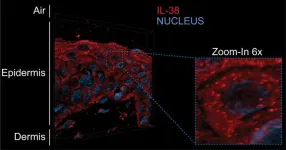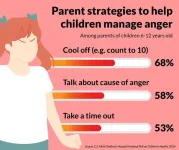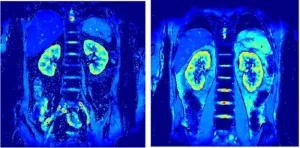Cocoa or green tea could protect you from the negative effects of fatty foods during mental stress - study
2024-11-18
(Press-News.org) University of Birmingham News Release
STRICTLY EMBARGOED UNTIL Monday 18th November 2024 8.00am UK/ 3.00am EST
Cocoa or green tea could protect you from the negative effects of fatty foods during mental stress - study
New research has found that a flavanol-rich cocoa drink can protect the body’s vasculature against stress even after eating high-fat food.
Food choices made during periods of stress can influence the effect of stress on cardiovascular health. For example, recent research from the University of Birmingham found that high-fat foods can negatively affect vascular function and oxygen delivery to the brain, meanwhile flavanol compounds found in abundance in cocoa and green tea can protect vascular function during periods of everyday stress.
Now, in a new study, the same research team has found that drinking cocoa high in flavanols in combination with a fatty meal can counteract some of the impact of fatty food and protect the vascular system from stress.
The research has been published today (18th November) in the journal Food and Function.
Dr Catarina Rendeiro, Assistant Professor in Nutritional Sciences at the University of Birmingham, and leading author said: “We know that when people are stressed, they tend to gravitate towards high-fat foods. We have previously shown that fatty food can impair the body’s vascular recovery from stress. In this study, we wanted to see if adding a high-flavanol food to the fatty meal would alleviate the negative impact of stress in the body”
Rosalind Baynham, first author on the paper, explained: “Flavanols are a type of compound that occur in different fruits, vegetables, tea and nuts including berries and unprocessed cocoa. Flavanols are known to have health benefits, particularly for regulating blood pressure and protecting cardiovascular health.
“We took a group of young healthy adults and gave them two butter croissants with 10 g salted butter, 1.5 slices of cheddar cheese and 250 ml whole milk as breakfast, and either a high-flavanol cocoa or a low-flavanol cocoa drink. Following a rest period, we asked the participants to complete a mental maths test which increased in speed for eight minutes, alerting them when they got an answer wrong. During the 8 minute rest period and 8 minute mental maths test, we measured forearm blood flow, cardiovascular activity and prefrontal cortex (PFC) tissue oxygenation. We also measured vascular function using Brachial Flow-mediated dilatation (FMD), which is a prognostic measure for future risk of cardiovascular disease. This stress task induced significant increases in heart rate and blood pressure, similar to the stress you may encounter in daily life.”
The cocoa beverages were prepared by dissolving 12 g cocoa powder into 250 ml of whole milk. The low-flavanol powder was an alkalized cocoa powder which was processed to reduce total flavanols to 5.6 mg per serving; and the high-flavanol cocoa powder was a non-alkalized powder, delivering 695.0 mg total flavanols per serving. Alkalization is a process typically used in chocolate making to enhance flavour, but unfortunately it reduces the amount of flavanols.
The team confirmed that consuming fatty foods with the low-flavanol drink when mentally stressed reduced vascular function (by 1.29% FMD) and lasted up to 90 minutes after the stressful event was over. The findings also showed that the cocoa drink high in flavanols was effective at preventing the decline in vascular function following stress and fat consumption. Brachial flow-mediated dilatation was significantly higher following high-flavanol cocoa compared to low-flavanol cocoa 30 and 90 minutes after the stressful period. The team had also found in their previous work, that eating high-fat foods attenuated cerebral oxygenation in the pre-frontal cortex, during stress. However, cocoa flavanols did not improve cerebral oxygenation or impact mood.
Dr Catarina Rendeiro, Assistant Professor in Nutritional Sciences at the University of Birmingham, added: “This research shows that drinking or eating a food high in flavanols can be used as a strategy to mitigate some of the impact of poorer food choices on the vascular system. This can help us make more informed decisions about what we eat and drink during stressful periods.”
In the supermarket look for a minimally processed cocoa powder, and if cocoa isn’t quite your beverage of choice, there are other ways you can get a higher dose of flavanols, such as green tea, black tea and berries. Recent published guidelines for flavanol intake recommend between 400 to 600 mg/day, which can be achieved for example, by consuming two cups of black or green tea, or a combination of berries, apples and high-quality cocoa.
Jet Veldhuijzen van Zanten, Professor of Biological Psychology at the University of Birmingham, and author of this paper added: “Modern life is stressful and the impact of stress on our health and the economy has been well documented, so any changes we can make to protect ourselves from some of the symptoms of stress is positive. For those who tend to reach for a treat when stressed or depend on convenient food because they work high-pressure jobs or are time-poor, incorporating some of these small changes could make a real difference.”
ENDS
END
ELSE PRESS RELEASES FROM THIS DATE:
2024-11-18
The mechanisms underlying skin renewal are still poorly understood. Interleukin-38 (IL-38), a protein involved in regulating inflammatory responses, could be a game changer. A team from the University of Geneva (UNIGE) has observed it for the first time in the form of condensates in keratinocytes, the cells of the epidermis. The presence of IL-38 in these aggregates is enhanced close to the skin’s surface exposed to atmospheric oxygen. This process could be linked to the initiation of programmed ...
2024-11-18
A recent analysis reveals striking disparities in the cost and availability of cancer drugs across different regions of the globe, with significant gaps between high- and low-income countries. The findings are published by Wiley online in CANCER, a peer-reviewed journal of the American Cancer Society.
The analysis, which drew on relevant published studies and reviews related to cancer and the availability of cancer treatments, predicts that there will be an estimated 28.4 million new cancer cases worldwide in 2040 alone. In the coming years, cancer incidence is expected to increase most significantly in low-income countries. Cancer mortality ...
2024-11-18
While coronary heart disease and diabetes are often seen in the same patients, a diagnosis of diabetes does not necessarily mean that patients also have coronary heart disease, according to a new study from researchers at Intermountain Health in Salt Lake City.
The Intermountain study found that proactively screening patients with diabetes 1 and 2 for coronary heart disease who have not shown symptoms of heart problems does not improve long-term mortality rates, nor does it lower the chance of them ...
2024-11-18
Different species of seabirds can coexist on small, isolated islands despite eating the same kind of fish. A researcher at Uppsala University has been involved in developing a mathematical model that can be used to better understand how this ecosystem works.
“Our model shows that coexistence occurs naturally when species differ in their ability to catch fish and to efficiently fly long distances to the area where they catch fish,” says Claus Rüffler, Associate Professor of Animal Ecology at Uppsala University.
Seabirds can breed in very large colonies, sometimes consisting of several hundred thousand pairs. Ecologists working ...
2024-11-18
ANN ARBOR, Mich. – Many parents are all too familiar with angry outbursts from their children, from sibling squabbles to protests over screen time limits.
But some parents may find it challenging to help their kids manage intense emotions. One in seven think their child gets angrier than peers of the same age and four in 10 say their child has experienced negative consequences when angry, a new national poll suggests.
Seven in 10 parents even think they sometimes set a bad example of handling anger themselves, according to the University of Michigan Health ...
2024-11-18
The scientific debate around the installation of a massive underwater curtain to protect Antarctic ice sheets from melting lacks its vital political perspective. A Kobe University research team argues that the serious questions around authority, sovereignty and security should be addressed proactively by the scientific community to avoid the protected seventh continent becoming the scene or object of international discord.
A January 2024 article in Nature put the spotlight on a bold idea originally proposed by Finnish researchers to save the West Antarctic ...
2024-11-18
Research into new bandaging aims to ease the agony experienced by those living with genetic skin condition Epidermolysis Bullosa (EB), commonly referred to as 'butterfly skin'.
Scientists at Maynooth University in Ireland are leading research into whether ‘spray on, wash off’ bandages will be a viable alternative to those currently used, which can cause severe pain when applied and removed.
EB, which affects over 500,000 children and adults worldwide including 5,000 in the UK and 300 ...
2024-11-18
When pain signals are passed along the nervous system, proteins called calcium channels play a key role. Researchers at Linköping University, Sweden, have now pinpointed the exact location of a specific calcium channel fine-tuning the strength of pain signals. This knowledge can be used to develop drugs for chronic pain that are more effective and have fewer side effects.
Pain sensations and other information are mainly conducted through our nervous system as electrical signals. Yet at decisive moments, this information is converted to biochemical signals, in the form of specific molecules. To develop future drugs ...
2024-11-18
Ticks travel light, but they carry pathogens with them. When they parasitize migrating birds, these journeys can take them thousands of miles away from their usual geographic range. Historically, they haven’t been able to establish themselves, due to unsuitable climate conditions at the other end of their long journeys. But now, thanks to the climate crisis, it’s getting easier for ticks to survive and spread, potentially bringing novel tick-borne pathogens with them.
“If conditions become more hospitable for tropical tick species to establish themselves in areas where they would previously have been unsuccessful, then there is a chance they could bring new diseases ...
2024-11-18
Type 2 diabetes can lead to diabetic kidney disease, but a class of drugs that cause the kidneys to remove glucose through urine has been gaining attention. An Osaka Metropolitan University-led research group has investigated how such drugs maintain kidney health.
Known as SGLT2 (sodium-glucose cotransporter-2) inhibitors, the drugs are used to treat type 2 diabetes along with an exercise and diet regimen. The group led by Graduate School of Medicine Associate Professor Katsuhito Mori focused on the SGLT2 inhibitor canagliflozin and its effects on the kidney.
Using BOLD ...
LAST 30 PRESS RELEASES:
[Press-News.org] Cocoa or green tea could protect you from the negative effects of fatty foods during mental stress - study






